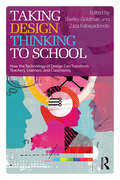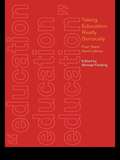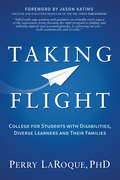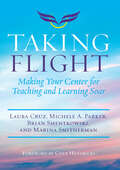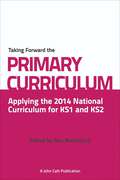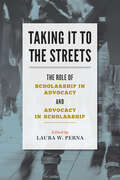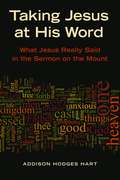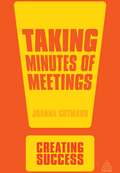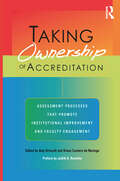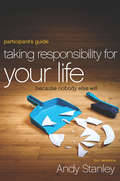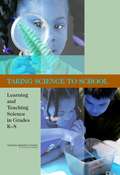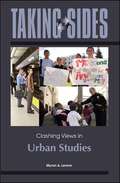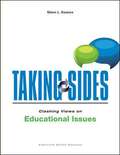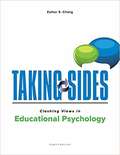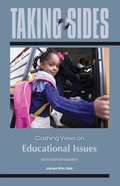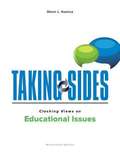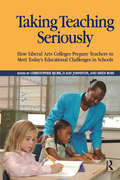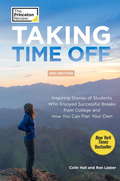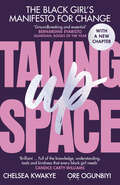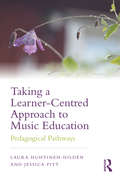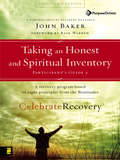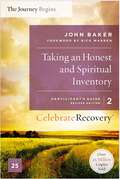- Table View
- List View
Taking Design Thinking to School: How the Technology of Design Can Transform Teachers, Learners, and Classrooms
by Shelley Goldman Zaza KabayadondoDesign thinking is a method of problem-solving that relies on a complex set of skills, processes and mindsets that help people generate novel solutions to problems. Taking Design Thinking to School: How the Technology of Design Can Transform Teachers, Learners, and Classrooms uses an action-oriented approach to reframing K-12 teaching and learning, examining interventions that open up dialogue about when and where learning, growth, and empowerment can be triggered. While design thinking projects make engineering, design, and technology fluency more tangible and personal for a broad range of young learners, their embrace of ambiguity and failure as growth opportunities often clash with institutional values and structures. Through a series of in-depth case studies that honor and explore such tensions, the authors demonstrate that design thinking provides students with the agency and compassion that is necessary for doing creative and collaborative work, both in and out of the classroom. A vital resource for education researchers, practitioners, and policymakers, Taking Design Thinking to School brings together some of the most innovative work in design pedagogy.
Taking Education Really Seriously: Four Years Hard Labour
by Michael FieldingMichael Fielding looks at what the Labour Government has achieved in the last four years with its policy of 'education, education, education'.There has been widespread disappointment in New Labour's education policies, which on the whole have not steered too far wide of those put in place by Margaret Thatcher, including issues of marketisation, testing and performativity. Michael Fielding has called on the key policy thinkers in education to offer their opinions on what has happened in education over the first three to four years of the New Labour Government.Education policy is a controversial subject and with a General Election expected within the next few months, this book will be read widely by people within education, politicians and journalists and by others anxious to get to facts and avoid the spin. The subject matter and the presence of so many high profile educationalists make this an essential read.
Taking Flight: College for Students with Disabilities, Diverse Learners and Their Families
by Perry LaRoqueA learning differences expert shares stories, strategies, and information about what students with disabilities need to be successful in college. In Taking Flight, Dr. Perry T. Laroque shares his insight and expertise on a range of important issues many students with a wide range of disabilities face as they head off to college. Rather than merely focusing on the academic aspects, LaRoque addresses the full college experience, discussing the strategies and perspective needed to thrive in the classroom and beyond. With a mix of personal stories, humor, and frank advice, Perry T. LaRoque explores topics such as the concept of disability, the need for positive self-expression, college bureaucracy, roommate relationships, and having fun. Taking Flight addresses the truly relevant issues needed for happiness and success in college and teaches readers not only how to do well in the system, but how to overcome a system that isn&’t designed for today&’s diverse learners.
Taking Flight: Making Your Center for Teaching and Learning Soar
by Laura Cruz Brian Smentkowski Michele A. Parker Marina SmithermanTaking Flight synthesizes research on best practices for running centers of teaching and learning, providing practical guidance and resources for educational developers who are looking to open new centers; revitalize an underperforming center; or sustain and enhance an effective center. The authors offer the necessary background, relevant examples, and practical exercises specifically designed to support the sustained vitality of educational development and its role in fostering organizational change. The book is practical in nature, with step sheets, diagrams, and similar materials designed to facilitate reflection and application. The book guides educational developers in enhancing and applying their knowledge, skills and abilities to establish a leadership role which, in turn, will enable them to play a pivotal role in translating visionary strategies into meaningful actions across their respective campuses. An effective, well-managed center for teaching and learning has the potential to benefit its institution’s faculty, staff, students, and community members. Through fostering a productive relationship with campus administration, centers can improve morale, contribute to shaping and achieving institutional learning mission and outcomes, enhance institutional reputation, and make a contribution to the practice of teaching and learning across the academy. The materials in Taking Flight were honed through a series of national workshops developed under the aegis of the POD Network – the professional organization for educational developers in the United States. This book answers a need for a resource for directors and staff of centers that has been identified by leaders in the field. It also provides valuable context for all leaders concerned about student learning and the improvement of teaching.
Taking Forward the Primary Curriculum: Applying The 2014 National Curriculum For Ks1 And Ks2 (Taking It Forward Ser.)
by Roy BlatchfordThis book has a simple intent. In September 2014, primary schools in England will be expected to adopt a new national curriculum. There is good time to prepare. At this point of curriculum change and development in England's schools, the contributors offer their considered reflections on how primary schools across the country might take forward and shape their own curriculum framework for pupils. The spirit of the book is, based on considerable leadership experience in schools, letting-a-thousand-flowers-bloom rather than recommending a one-size-fits-all approach. This book does not set out to analyse the content of the 2014 Primary Curriculum, nor to present ways in which individual schools should plan their schemes of work and weekly or monthly planning. That is rightly the province of each school, learning from and sharing best practice with others. Rather, the contributors to this book present underpinning values, ideas and approaches to successful curriculum planning, rooted in many years of leading and working in schools. Their reflections come from varying perspectives: teachers, headteachers, directors of foundations and leading thinkers on education, each of whom is involved in the work of the National Education Trust (www.nationaleducationtrust.net), an independent charitable foundation which champions best practice.
Taking Forward the Primary Curriculum: Applying The 2014 National Curriculum For Ks1 And Ks2 (Taking It Forward Ser.)
by Roy BlatchfordThis book has a simple intent. In September 2014, primary schools in England will be expected to adopt a new national curriculum. There is good time to prepare. At this point of curriculum change and development in England's schools, the contributors offer their considered reflections on how primary schools across the country might take forward and shape their own curriculum framework for pupils. The spirit of the book is, based on considerable leadership experience in schools, letting-a-thousand-flowers-bloom rather than recommending a one-size-fits-all approach. This book does not set out to analyse the content of the 2014 Primary Curriculum, nor to present ways in which individual schools should plan their schemes of work and weekly or monthly planning. That is rightly the province of each school, learning from and sharing best practice with others. Rather, the contributors to this book present underpinning values, ideas and approaches to successful curriculum planning, rooted in many years of leading and working in schools. Their reflections come from varying perspectives: teachers, headteachers, directors of foundations and leading thinkers on education, each of whom is involved in the work of the National Education Trust (www.nationaleducationtrust.net), an independent charitable foundation which champions best practice.
Taking It to the Streets: The Role of Scholarship in Advocacy and Advocacy in Scholarship
by Laura W. PernaAs scholars become more public, what responsibility do they have to advocate for policies that will advance equity, inclusiveness, and social change?Higher education scholars often conduct research on topics about which they care deeply, but to what extent should they be advocates for reform and social change? One school of thought believes researchers should remain dispassionate and data focused; the other, that a researcher, by the very questions she asks, can help effect social change. In this book, Laura W. Perna questions how, why, and when higher education researchers should be public intellectuals and whether, armed with research, they are—and should be—a powerful force for change.Taking It to the Streets collects essays from nationally and internationally recognized thought leaders with diverse opinions and perspectives on these issues. With the intentional inclusion of voices on different sides of this discussion, the volume offers a thought-provoking and nuanced understanding of the multifaceted connections between higher education research, advocacy, and policy.Contributors: Ann E. Austin, Estela Mara Bensimon, Anthony A. Berryman, Mitchell J. Chang, Cheryl Crazy Bull, Adam Gamoran, Sara Goldrick-Rab, Shaun R. Harper, Donald E. Heller, Adrianna Kezar, Simon Marginson, James T. Minor, Jeannie Oakes, Laura W. Perna, Gary Rhoades, Daniel G. Solorzano, Christine A. Stanley, William G. Tierney
Taking Jesus at His Word: What Jesus Really Said in the Sermon on the Mount
by Addison H. HartBlessed are the poor in spirit. A city set on a hill cannot be hid. You cannot serve God and mammon. Judge not, that you be not judged. Though such sayings from Jesus' Sermon on the Mount are very familiar, many people -- including Christians! -- struggle to fully understand and follow them. For those who are brave enough to reconsider what Jesus really said, Addison Hodges Hart offers Taking Jesus at His Word.
Taking Minutes of Meetings
by Joanna GutmannThe minute-taker is one of the most important and powerful people in a meeting and they should use this opportunity to develop knowledge, broaden horizons and build credibility within the organization. Taking Minutes of Meetings, 3rd edition is an easy to read 'dip-in, dip-out' guide which shows you how to confidently arrange meetings and produce minutes. It provides hands-on advice about the sections of a meeting as well as tips on how to create an agenda, personal preparation, best practice advice on taking notes and how to improve your accuracy. Brand new chapters include guidance on using technology to maximize effectiveness and practical help with taking minutes for a variety of different types of meetings.
Taking Off
by Jenny MossReimagining the days surrounding this unforgettable event in history, readers are brought back to 1986 as the astronauts prepare for the Challenger mission, and Christa McAullife trains to be the first teacher in space. When a teen named Annie meets Christa, she is fascinated by Christa's courage. Truly inspired, Annie is determined to make it to Florida to see the Challenger launch, a trip that will forever change how she thinks about herself and her secret desire for her own future. Although she is devastated when tragedy strikes, Annie honors Christa by following her own dream, despite the obstacles. Bringing in her experience as a NASA engineer, Jenny Moss weaves a moving story that recaptures the inspiration teens must have felt years ago as they watched Christa McAuliffe reach for the sky.
Taking Ownership of Accreditation: Assessment Processes that Promote Institutional Improvement and Faculty Engagement
by Judith A. Ramaley Amy Driscoll Diane Cordero de NoriegaThis book demonstrates how a participatory approach to assessment and accreditation in their new forms creates a synergy for learner-centered education. It is a guide to approaching the accreditation process from a campus-wide perspective of ownership--illustrated by rich descriptions of how faculty, students, and administrators at California State University Monterey Bay engaged with and successfully focused their accreditation processes on the improvement of their practices. The approach that the authors describe was driven by a commitment to go beyond satisfying the accreditation expectations so as to promote ongoing and long-term improvement of student learning. It also reflects the shift of responsibility for assessment within institutions from a designated office to individual faculty and staff, entire departments, and the campus as a whole.The authors document strategies that are practical—ready to use or adapt—that are appropriate for all campuses. They also provide guidelines for the documentation process that accreditation demands. They demonstrate how they reduced traditional resistance to assessment by emphasizing its use for the improvement of student learning, helping faculty with their own teaching, and creating frameworks for continuing improvements that are valued by faculty.The authors emphasize the need for every institution to take into account its unique mission, vision, and core values; and to recognize the importance of individual departmental cultures. Although their accreditation "triggered" CSUMB’s engagement with assessment, the authors discuss other opportunities for jump-starting the process.
Taking Responsibility for Your Life Participant's Guide: Because Nobody Else Will
by Andy StanleyRESPONSIBILITIES. We all have them. But we don't all take them as seriously as we ought to. Wouldn't it be great, though, if we all took responsibility for the things we are responsible for? Wouldn't it be great if you took responsibility for everything you're responsible for? It's time to stop the finger-pointing and excuse-making and to remove the “ir” in irresponsible. In this four-session study, Andy Stanley tells us it’s time to ask ourselves, “Am I REALLY taking responsibility for my life?” Designed for use with the video.
Taking Science to School: Learning and Teaching Science in Grades K-8
by National Research Council of the National AcademiesWhat is science for a child? How do children learn about science and how to do science? Drawing on a vast array of work from neuroscience to classroom observation, Taking Science to School provides a comprehensive picture of what we know about teaching and learning science from kindergarten through eighth grade. By looking at a broad range of questions, this book provides a basic foundation for guiding science teaching and supporting students in their learning. Taking Science to School answers such questions as: *When do children begin to learn about science? Are there critical stages in a child's development of such scientific concepts as mass or animate objects? *What role does nonschool learning play in children's knowledge of science? *How can science education capitalize on children's natural curiosity? *What are the best tasks for books, lectures, and hands-on learning? *How can teachers be taught to teach science? The book also provides a detailed examination of how we know what we know about children's learning of science--about the role of research and evidence. This book will be an essential resource for everyone involved in K-8 science education--teachers, principals, boards of education, teacher education providers and accreditors, education researchers, federal education agencies, and state and federal policy makers. It will also be a useful guide for parents and others interested in how children learn.
Taking Sides (Sweet Valley High #31)
by Francine PascalTAKING SIDES. A matchmaking duel... Jeffrey French has been at Sweet Valley High for only one week, and already he's made quite an impression-- especially with the girls. Enid Rollins has a crush on the rugged junior, but just as she's about to claim Jeffrey for her own, Lila Fowler declares that Jeffrey is just the boy for her. Elizabeth Wakefield isn't about to let Lila steal Jeffrey from her best friend. And when Jessica, Elizabeth's twin, finds out her sister is helping Enid, she vows to do whatever she can to help Lila. Jessica's not going to stand for Jeffrey ending up with Enid, and she's certainly not going to let herself be outwitted by her own twin!
Taking Sides: Clashing Views In Urban Studies
by Myron Alfred LevineUrban affairs deals with important issues and policy questions. It is at the local level—at the regional, city, and even at the street level—that government decisions concerning law enforcement, schooling, housing, transportation, land use, and the environment, have the greatest impact on people's lives.
Taking Sides: Clashing Views an Educational Issues (Expanded Eighteenth Edition)
by Glenn KoonceThe Taking Sides Collection on McGraw-Hill Create(tm) includes current controversial issues in a debate-style format designed to stimulate student interest and develop critical thinking skills. This Collection contains a multitude of current and classic issues to enhance and customize your course. You can browse the entire Taking Sides Collection on Create, or you can search by topic, author, or keywords. Each Taking Sides issues is thoughtfully framed with Learning Outcomes, an Issue Summary, an Introduction, and an Exploring the Issue section featuring Critical Thinking and Reflection, Is There Common Ground?, and Additional Resources and Internet References. Go to McGraw-Hill Create(tm) at www. mcgrawhillcreate. com, click on the "Collections" tab, and select The Taking Sides Collection to browse the entire Collection. Select individual Taking Sides issues to enhance your course, or access and select the entire Koonce: Taking Sides: Clashing Views on Educational Issues, 18/e Expanded ExpressBook for an easy, pre-built teaching resource by clicking here. An online Instructor's Resource Guide with testing material is available for each Taking Sides volume. Using Taking Sides in the Classroom is also an excellent instructor resource. Visit the Create Central Online Learning Center at www. mhhe. com/createcentral for more details.
Taking Sides: Clashing Views in Educational Psychology (Eighth Edition)
by Esther S. ChangThe Taking Sides Collection on McGraw-Hill Create includes current controversial issues in a debate-style format designed to stimulate student interest and develop critical thinking skills. This Collection contains a multitude of current and classic issues to enhance and customize your course.
Taking Sides: Clashing Views on Educational Issues (17th Edition)
by James William NollThis book presents opposing or sharply varying viewpoints on educational issues of current concern. Unit 1 offers consideration of five basic theoretical issues that have been discussed by scholars and practitioners in past decades and are still debated today. Unit 2 features five issues that are fundamental to understanding the present circumstances that shape American education. Unit 3 examines more specific issues currently being discussed. This seventeenth edition offers five new issues
Taking Sides: Clashing Views on Educational Issues (19th Edition)
by Glenn L. KoonceThis book presents opposing or sharply varying viewpoints on educational issues of current concerns. Unit 1 offers consideration of three basic theoretical issues that have been discussed by scholars and practitioners in past decades and are still debated today: curriculum content and its imposition upon the young, the philosophical underpinning of the process of education, and the purpose of public education. Unit 2 features five issues that are fundamental to understanding the present circumstances that shape American education: democratic classrooms for citizenship preparation, student First Amendment rights, common curriculum considerations, policy and the Common Core standards, and the challenges of poor school performance. Unit 3 examines more specific issues currently being discussed: arming teachers, universal preschool, teacher preparation and the federal government, zero tolerance and the courts, no-zero grading, virtual schools, twenty-first century skills movement, flipped learning, class size and student achievement, school funding and student achievement, charter school expansion, and the impact of technology on teaching and learning.
Taking Teaching Seriously: How Liberal Arts Colleges Prepare Teachers to Meet Today's Educational Challenges in Schools
by Christopher Bjork D. Kay Johnston Heidi A. RossThis highly readable book contains important lessons for us all. -Katherine Schultz, Graduate School of Education, University of Pennsylvania Taking Teaching Seriously expands and enriches discussions about teacher preparation in the United States. Its authors describe the unique contexts for teacher preparation offered by liberal arts institutions and analyze the effects of these programs on their graduates and on K-12 schools. They emphasize that the goals and conditions for teacher preparation differ from larger public institutions in several key respects including supervisor-student teacher relationships, philosophical foundations, and approaches to clinical fieldwork. Taken together, the essays provide compelling evidence that educational studies programs in liberal arts colleges and universities constitute a vital component of the teacher education system in the United States. Contributors: Irving Epstein, Alice Lesnick, Alison Cook-Sather, Lisa Smulyan, Vicki Kubler LaBoskey, Linda R. Kroll, Christopher Roellke, Jennifer Rice, Susan Riemer Sacks, Charlotte Mendoza
Taking Time Off, 2nd Edition
by Ron Lieber Colin HallHave you ever thought about taking time off to * ride your bike across the United States?* conduct research in the Amazonian rain forest?* work on a presidential campaign?* build houses for the poor?Tens of thousands of students each year take a break before, or even during college to work, travel, volunteer, or do something just plain different. No matter what you may plan to do with your time away, Taking Time Off shows you how to make the most of it. Included are the inspiring stories of 26 students whose pursuits in their time away from school were fulfilling and enjoyable. You'll find practical advice on every aspect of planning a break, from researching your options and financing your leave to convincing your parents it's a worthy idea. This book's resources section also lists programs, jobs, and American and international organizations that can help you to plan your own time off.
Taking Up Space: The Black Girl’s Manifesto for Change
by Chelsea Kwakye Ore Ogunbiyi'Brilliant' CANDICE CARTY-WILLIAMS, author of QUEENIE'Essential' BERNARDINE EVARISTO, author of GIRL, WOMAN, OTHER'Hugely important' PAULA AKPAN____________________________As a minority in a predominantly white institution, taking up space is an act of resistance. Recent Cambridge grads Chelsea and Ore experienced this first-hand, and wrote Taking Up Space as a guide and a manifesto for change.FOR BLACK GIRLS:Understand that your journey is unique. Use this book as a guide. Our wish for you is that you read this and feel empowered, comforted and validated in every emotion you experience, or decision that you make.FOR EVERYONE ELSE:We can only hope that reading this helps you to be a better friend, parent, sibling or teacher to black girls living through what we did. It's time we stepped away from seeing this as a problem that black people are charged with solving on their own.It's a collective effort.And everyone has a role to play.Featuring honest conversations with students past and present, Taking Up Space goes beyond the buzzwords of diversity and inclusion and explores what those words truly mean for young black girls today.____________________________#Merky Books was set up by publishers Penguin Random House and Stormzy in June 2018 to find and publish the best writers of a new generation and to publish the stories that are not being heard. #Merky Books aims to open up the world of publishing, and this year has launched a New Writer's Prize and will soon be launching a #Merky Books traineeship. 'I know too many talented writers that don't always have an outlet or a means to get their work seen, and hopefully #Merky Books can now be a reference point for them to say "I can be an author", and for that to be a realistic and achievable goal... Reading and writing as a kid were integral to where I am today and I, from the bottom of my heart, cannot wait to hear your stories and get them out into the big wide world.'STORMZY
Taking a Learner-Centred Approach to Music Education: Pedagogical Pathways
by Laura Huhtinen-Hildén Jessica PittAdopting a fresh approach to the assumptions and concepts which underlie musical learning, Taking a Learner-Centred Approach to Music Education provides comprehensive guidance on professional and pedagogical aspects of learner-centred practice. This essential companion offers a pedagogy which is at once informed by theoretical understandings, and is underpinned by experience, practical examples, case studies and self-reflection. Initial chapters explore the theoretical dimensions of learner-centred music education, touching on aspects including collaborative learning, the learning environment and pedagogical sensitivity. Latter chapters delve deeper into the practical application of these teaching strategies and methods. The book invites its reader to reflect on topics including: music, emotions and interaction the voice and body as instruments making music visible and tangible improvising and learning music with instruments working with groups in creative activities the music pedagogue as a sensitive and creative instrument. Taking a Learner-Centred Approach to Music Education will deepen understanding, facilitate reflection and inspire new approaches to teaching in the field of music. It is essential reading for current and future practitioners involved in music education, early childhood music practice, community music, music therapy and special needs education.
Taking an Honest and Spiritual Inventory Participant's Guide 2
by John BakerA Program for Implementing a Christ-Centered Recovery Ministry in Your Church Alcoholism - Divorce - Sexual Abuse - Codependency - Domestic Violence - Drug Addiction - Sexual Addiction - Food Addiction - Gambling Addiction and many more! There is a way the church can help the hurting move beyond their wounds to experience the healing and forgiveness of Christ. Since 1991, more than 200,000 people have participated in the Celebrate Recovery programs offered at more than 3,500 churches, prisons, and rescue missions. Drawn from the Beatitudes, Celebrate Recovery helps people resolve painful problems in the context of the church as a whole. Newly updated, the kit includes: •1 20-minute DVD introductory guide for leaders •1 leader’s guide •1 of each participant’s guide (4 total) •CD-ROM with 25 lessons •CD-ROM with sermon transcripts and reproducible promotional materials •4-volume audio CD sermon series “And then there’s pastor John Baker, the founder of Celebrate Recovery… Big John and I shared something in common. We used to drink too much. And our hearts changed, and then we quit. That is a tried-and-true formula. The problem is government is not good at changing hearts. But people like John Baker have been good about it and successful doing that.” —President George W. Bush on Celebrate Recovery and its founder, John Baker, at the Faith- Based and Community Initiatives Conference, March 3, 2004.
Taking an Honest and Spiritual Inventory Participant's Guide 2: A Recovery Program Based on Eight Principles from the Beatitudes (Celebrate Recovery)
by John BakerThe Celebrate Recovery Participant&’s Guides are essential tools for the personal recovery journey. In the five lessons in Guide 2: Taking an Honest and Spiritual Inventory, you will experience an in-depth look at the 4th principle in the recovery process:4 Openly examine and confess my faults to God, to myself, and to someone I trust. "Happy are the pure in heart" (Matthew 5:8).By working through the lessons and exercises found in each of the four Participant&’s Guides you will begin to experience the true peace and serenity you have been seeking, restore and develop stronger relationships with others and with God, and find freedom from life's hurts, hang-ups, and habits.All the scriptures have been updated to the new NIV 2011 version.
